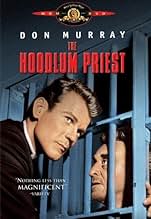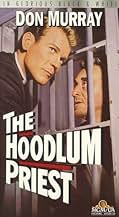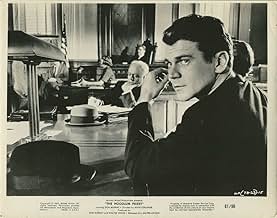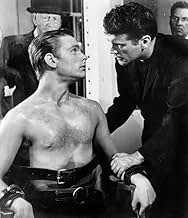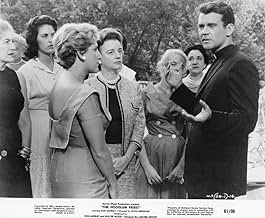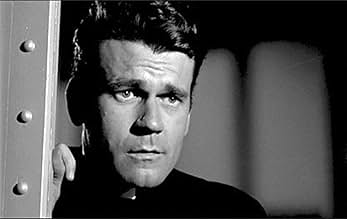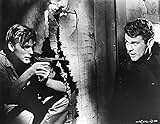CALIFICACIÓN DE IMDb
6.6/10
517
TU CALIFICACIÓN
Agrega una trama en tu idiomaBased on the life of Fr. Charles Clark, a minister to street gangs.Based on the life of Fr. Charles Clark, a minister to street gangs.Based on the life of Fr. Charles Clark, a minister to street gangs.
- Dirección
- Guionistas
- Elenco
- Premios
- 2 premios ganados y 1 nominación en total
Norman McKay
- Father Dunne
- (as Norman MacKaye)
Walter L. Wiedmer
- Father David Michaels
- (as Walter Wiedmer)
Opiniones destacadas
Father Charles Dismas Clark was by all accounts an extraordinary man and at least 30 years older than Don Murray who played him in The Hoodlum Priest. He came from a working class coal mining background in Pennsylvania, his ancestors were Molly Maguires. Not the kind to rise in the Catholic Church and he didn't. He died only two years after The Hoodlum Priest came out. But two years before Clark founded Dismas House, the first halfway house for newly released criminals from prison. Though I'm sure each state has its different standards, Dismas House became the prototype for such programs.
Murray plays the jive talking priest who speaks the language of the streets and gains the trust of the hoodlum element by doing so. It's the portrayal of a deeply dedicated man to his cause of ministering to a class of people not usually thought of as Christian material. Murray also produced this independent film released by United Artists on a shoe string budget that went way overboard for clearly a B picture.
In an article I read about the film Murray was in St. Louis promoting one of his films when a priest literally accosted him at the premiere and it was Father Clark. Fascinated by the man Murray agreed to do the film and set about to find the cast and financing for Hoodlum Priest.
Larry Gates plays a criminal attorney who helps Murray with setting up and financing Dismas House. In helping Murray realize his dream Gates' role is not all that different from Henry Hull's in Boystown.
Another plot thread is taken from the Pat O'Brien film Fighting Father Dunne where O'Brien is also trying found a home for orphans like Spencer Tracy in Boystown. Keir Dullea plays a troubled youth in his breakthrough role and Darryl Hickman plays the same kind of part in Fighting Father Dunne. In both films it was the failure here that contrasts the overall success. Both Hickman and Dullea have tragic and identical ends. Murray's facial reactions at Dullea's death is a priceless bit of acting without dialog.
Hoodlum Priest is a fine film a great example of what just a few dollars will get you with the right script, direction, and playing. Even if it put a few gray hairs in Murray's head when it went over budget.
Murray plays the jive talking priest who speaks the language of the streets and gains the trust of the hoodlum element by doing so. It's the portrayal of a deeply dedicated man to his cause of ministering to a class of people not usually thought of as Christian material. Murray also produced this independent film released by United Artists on a shoe string budget that went way overboard for clearly a B picture.
In an article I read about the film Murray was in St. Louis promoting one of his films when a priest literally accosted him at the premiere and it was Father Clark. Fascinated by the man Murray agreed to do the film and set about to find the cast and financing for Hoodlum Priest.
Larry Gates plays a criminal attorney who helps Murray with setting up and financing Dismas House. In helping Murray realize his dream Gates' role is not all that different from Henry Hull's in Boystown.
Another plot thread is taken from the Pat O'Brien film Fighting Father Dunne where O'Brien is also trying found a home for orphans like Spencer Tracy in Boystown. Keir Dullea plays a troubled youth in his breakthrough role and Darryl Hickman plays the same kind of part in Fighting Father Dunne. In both films it was the failure here that contrasts the overall success. Both Hickman and Dullea have tragic and identical ends. Murray's facial reactions at Dullea's death is a priceless bit of acting without dialog.
Hoodlum Priest is a fine film a great example of what just a few dollars will get you with the right script, direction, and playing. Even if it put a few gray hairs in Murray's head when it went over budget.
Irv Kerschner, who was George Lucas' teacher at USC and later directed one of his pupil's Star Trek features, made this glossy well-meaning melodrama released by United Artists in 1961. Shot on location in St. Louis and featuring the semi-documentary but often overly self-conscious B&W cinematography of Haskell Wekler, the story is based on the real life story of a Jesuit priest --perhaps the first man in America to set up a half-way house for ex-cons. Although its heart is in the right place, and the film makes the plea that the criminal justice system in the United States only serves to criminalize young offenders rather than reform them, Kershner cannot resist all the obvious opportunities to be arty: chases through railroad yards and into abandoned buildings with broken furniture and boarded-up windows providing the right shadows on the wall. He also hammers home his point by squeezing out the last drop of melodrama from the shaky plot, including a totally implausible electric chair sequence with the priest admitted into the chamber as his hoodlum friend is about to be electrocuted. The film tries to have its cake and eat it, too. In real life the Irish priest was helped to build his halfway house by a Russian-Jewish immigrant attorney, Morris Shenker, but the film homogenizes their relationship; the young offenders somehow feel as if they dropped out of "West Side Story," made the same year, because they were unable to sing and dance.
A visit to the other side of the tracks is what to expect here keeping mind that this could be the story of anyone young, misguided and lost without direction and surrounded by temptation and hopelessness. With that mind, watch how everything can wrong (Murphy's law) and then some. This movie also takes us to the fine line of choice and how in a moment of weakness or impulse, one bad choice can bring your whole life crashing down. Can't happen to you...you say? That's who visits with first. Also anyone that has lived knows the truth of this statement. How many times have we all said to ourselves: there go I but for the grace of God? The movie drives this point home too. Ten cents or ten million, all face the same problems and at the same time all of us have the same remedy too i.e. HOPE. If you add prayer to that and a sincere effort, you can rise above just about anything. Why? We were not put here to be defeated. Some really good dialog and scenes that try to reach for your emotions. Let them! One more thing. If someone has nothing and they offered anything and that offer should be respected even if your ...
I am 75 years of age and I remember seeing the movie sometime when it came to TV. It was not my sort of movie then or now. I could not recommend this movie to anyone today.
I do think however that Don Murray, as Father Clark, did some great acting in this movie.
I started my freshman year at a Catholic high school, De La Salle Military Academy, in 1955. The entire first week was a Catholic retreat (religion). I can not remember now if Father Clark did one day of the retreat or the entire week. I seem to think he did the entire week.
I was 14 years old and a Catholic and had gone to only Catholic schools. I had never heard of Father Clark.
As soon as I saw and heard Father Clark I was thinking this guy is crazy. I was thinking why are the Christian Brothers allowing a crazy man to be around a bunch of kids?
Later they had confession and I was sent into a room, alone, with Father Clark to hear my confession. He grabbed me and started to wail or say something about it will be OK or something like that. I did the confession thing and got the hell out of there.
I think the movie got a lot correct about Father Clark. But if they had shown the real Father Clark it would have been a much different movie and I do not think it would have been shown.
But if you want to get a little bit of an idea about what Father Clark was like then the movie and Don Murray do a pretty good job of it.
I do think however that Don Murray, as Father Clark, did some great acting in this movie.
I started my freshman year at a Catholic high school, De La Salle Military Academy, in 1955. The entire first week was a Catholic retreat (religion). I can not remember now if Father Clark did one day of the retreat or the entire week. I seem to think he did the entire week.
I was 14 years old and a Catholic and had gone to only Catholic schools. I had never heard of Father Clark.
As soon as I saw and heard Father Clark I was thinking this guy is crazy. I was thinking why are the Christian Brothers allowing a crazy man to be around a bunch of kids?
Later they had confession and I was sent into a room, alone, with Father Clark to hear my confession. He grabbed me and started to wail or say something about it will be OK or something like that. I did the confession thing and got the hell out of there.
I think the movie got a lot correct about Father Clark. But if they had shown the real Father Clark it would have been a much different movie and I do not think it would have been shown.
But if you want to get a little bit of an idea about what Father Clark was like then the movie and Don Murray do a pretty good job of it.
I first saw this film on T.V. when I was around 12 years old. It made a lasting and powerful impression. I remember actually sobbing at the end. The performances by both Don Murray and Keir Dullea were riveting. I've always been sorry that both actors had only a handful of truly great roles to play because they were/are capable of much more than they have been allowed to show us. Whenever I notice this film is appearing on T.V., I usually tune in. If you've never seen it or haven't seen it for a long time, watch for a chance to view it. I think you'll be moved by it.
¿Sabías que…?
- TriviaConcerned that the critics would not be kind to an actor appearing in a film he wrote, Don Murray penned the screenplay under the pseudonym "Don Deer", his nickname as a track and field athlete in high school in Rockaway, NY.
- ConexionesReferenced in La máscara del crimen (1976)
Selecciones populares
Inicia sesión para calificar y agrega a la lista de videos para obtener recomendaciones personalizadas
Detalles
- Fecha de lanzamiento
- País de origen
- Idioma
- También se conoce como
- The Hoodlum Priest
- Locaciones de filmación
- 301 East State Street, Jefferson City, Misuri, Estados Unidos(Missouri-Pacific Railroad train station)
- Productora
- Ver más créditos de la compañía en IMDbPro
Taquilla
- Presupuesto
- USD 600,000 (estimado)
- Tiempo de ejecución1 hora 41 minutos
- Color
- Relación de aspecto
- 1.66 : 1
Contribuir a esta página
Sugiere una edición o agrega el contenido que falta



